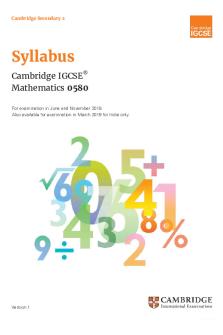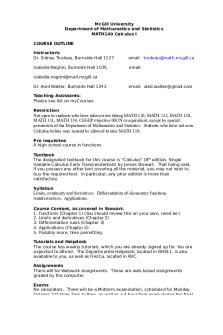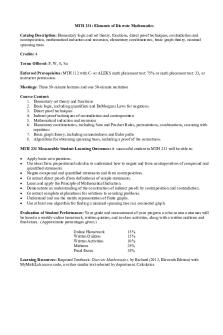MATH 2210Q - Syllabus PDF

| Title | MATH 2210Q - Syllabus |
|---|---|
| Author | Matthew Cheung |
| Course | Applied Linear Algebra |
| Institution | University of Connecticut |
| Pages | 5 |
| File Size | 76.3 KB |
| File Type | |
| Total Downloads | 23 |
| Total Views | 142 |
Summary
Syllabus...
Description
Syllabus MATH2210 Fall 2020 ¨ ur Esentepe Ozg¨ August 31, 2020 1.
Instructor
¨ ur Esentepe and I am an Assistant Research Professor at the Department of Mathematics. My name is Ozg¨ My email address is ozgur[at]esentepe[dot]uconn[dot]edu My office MONT306 is located in Monteith Building. However, during Fall 2020 I will not be visiting my office. I prefer being called by my first name or by Hocam (pronounced Hodjam). My preferred pronouns are he/him.
2.
Course Description
Course Description. This is an introductory course on linear algebra from a computational point of view. You will see systems of equations, matrices, linear maps, eigenvalues, inner products and more! The course is an introduction to the techniques of linear algebra with elementary applications. Prerequisites. MATH 1132 or 1152 or 2142. Recommended preparation: a grade of C- or better in MATH 1132. Not open after passing MATH 2144, 3210, 3510, or 3710. Repeat restrictions apply. See advising.uconn.edu/repeat-policy for information. Lectures. This course has two lecture sessions. Section 001 meets MWF 1:25-2:15 while Section 002 meets MWF 2:30-3:20. Lectures will take place at instructor’s WebEx room. Attending the lectures is not mandatory but is strongly recommended - see the grade distribution. During the lectures, I will either not be lecturing at all or will lecture only a little bit. Instead, you will be required to do readings before coming to the classroom and we will have discussions and problem solving together. A schedule of these readings will be given to you below. All lectures will be recorded. If you miss a lecture, you do not have to email me. I know that you have a legitimate reason, I do not need to hear it. Course Webpage. Our Course Page is on HuskyCT. From there, you will have access to Webex, Teams and Pearson MyLab when necessary. Textbook. Linear Algebra and its applications, 5th edition, by Lay, Lay and McDonald. The textbook will be bundled with Pearson MyLab.
1
3.
Grade Distribution
The basic distrbution is as follows. • MyLab Homework, 20%. • Graded Group Chats, 2 × 15%. • Weekly Theoretical Questions, 10%. • Weekly Self Reflection, 15%. • Term Paper, 10%. • Engagement, 5%. • Final Exam, 15%. Some of these items are group work while some are to be completed individually. We shall start with the individual ones. MyLab Homework. You have to purchase Pearsons MyLab and complete basic computational questions before their due dates. MyLab is linked to our HuskyCT and you can find it on the left panel when you are on our course webpage on HuskyCT. Weekly Theoretical Questions. For ten weeks, I will ask you one theoretical question per week to be submitted through HuskyCT. You will be expected to answer these questions with your own words, clearly and in detail. I will make sure to add a list of expectations for each theoretical question. If your answer satisfies all the expectations you will get 1 point, otherwise you will get 0 points and you can resubmit in one week to get 0.5 points. Weekly Self Reflection. For ten weeks, I will ask you to reflect on what you learned during the week. This 10 percent will be about your learning experience in this course. I believe that reflecting on this experience is good for our learning. Questions will include: What was the most challenging concept, what was one thing you think you learned well, how would you explain this concept to a high school student etc. Until this semester, the format of this assignment was very rigid. I always asked for an essay to be submitted on HuskyCT. This semester, I will also allow TikTok, YouTube, Twitter, Spotify Podcast, Wordpress, Blogpost etc. If you are interested in these other formats, I can provide you some examples. Contact me. Engagement. During the term, I will judge how much you are engaging with me and your classmates. You can gain points for this if you regularly attend lectures, answer questions during lectures, answer questions of others on Teams chats, ask questions during office hours, ask questions during lectures etc. Final Exam. At the end of the term, there will be a final exam. The date will be announced by the university during the semester. This is the individual portion of the grade distribution. For Graded Group Chats and Term Paper, you will need a group. The groups will be 5-7 people in size and will be determined after two weeks of classes. You will have the option to choose your own group members. If you wish not to choose your own group, I will randomly choose a group for you. Groups will use Microsoft Teams to discuss their work. More details will be given during lectures and office hours. Graded Group Chats. There will be two graded group chats during the semester. This is a 1 hour process outside lecture times where your group and I have a private meeting and just talk about linear algebra. I will give you a grade depending on how this conversation goes. When you show up for this conversation on my WebEx room, you will be given a set of topics that we can talk about. Then, you will have 30 minutes to prepare with your group and 30 minutes to have a conversation with me on these topics. I will moderate this conversation by asking you questions and your answers will determine your grades. The first graded group chat will be during the week of October 5-9 and the second one will be during the week of November 16-20.
2
Term Paper. With your group members, you will write a term paper. A list of topics will be given during the semester and you will be expected to work on one of these topics with your group members. The paper has to be typed up in LateX by at least one of the group members and you will be given a tutorial on this during the semester. Grading Criteria. The following is the grading chart for this course: A = 93-100, A- = 90-92, B+ = 87-89, B = 83-86, B- = 80-82, C+ = 77-79, C = 73-76, C- = 70-72, D+ = 67-69, D = 63-66, D- = 60-62, F = 0-59.
4.
Readings and Videos
Have you ever felt that the lectures are too fast and you have troubles understanding what is going on? Have you ever gone back home after a confusing lecture, watched a YouTube video and understood much better instantly? Well, most of the time the reason for this is that you are exposed to the material for the first time during the lectures. Imagine you are new to a board game. After you play it once, the second time is more enjoyable. Because this time, you know what is going on. A math lecture is like this, too. In order to prevent this, you are assigned readings before each class. This way, you will be exposed to the material before coming to the class. So, the better understanding will happen in class, where you can actually ask questions, instead of at home where you can not ask any questions to the book or the YouTube channel you are learning from. So, you are advised to read materials before coming to the class. The lectures will be designed assuming that you do this. If you do not come prepared for class and you feel like “I am not learning anything in lectures” then you should reflect on that.
5.
Tea Times
I will have regularly scheduled tea times: Monday, Wednesday and Friday 3:20-4:00. I strongly encourage you to attend tea times and discuss linear algebra with me. You do not have to have a specific question, you can just drop by and study while you are logged into my WebEx room. Or you may have questions prepared and ask away. I do not conduct research during tea times. This means that you are not interrupting me by coming to them. So, please use this opportunity to talk math with me.
6.
Email Policy
All communication must be through your UConn email address. If you use another email address, you will either receive a reminder of this policy or your email will be dismissed. Please refer to the syllabus and the course website before emailing. Most of the time, the answer is available. If this is the case, you will either receive a reminder or your email will be dismissed. I will do my best to respond to any emails within 24 hours. If your email does not receive a response in 24 hours, please try again and thank you for your patience. I will not check my emails during weekends and I will not expect you to do so. If your question is not personal, then I ask you please not to email me and instead use Microsoft Teams to ask your question. For instance, if you think that there is a typo in a theoretical question, you can ask it on Teams so that everyone can join the conversation.
3
7.
Microsoft Teams
When the classes are in person, you can meet with people outside class time and work with them in library. What happens when we move online? This semester, we have a team in Microsoft Teams where you can hang out and chat with your classmates. You will also have different streams for your group work. A link to Teams will be in HuskyCT.
8.
Policies
Policy Against Discrimination, Harassment and Related Interpersonal Violence. The University is committed to maintaining an environment free of discrimination or discriminatory harassment directed toward any person or group within its community – students, employees, or visitors. Academic and professional excellence can flourish only when each member of our community is assured an atmosphere of mutual respect. All members of the University community are responsible for the maintenance of an academic and work environment in which people are free to learn and work without fear of discrimination or discriminatory harassment. In addition, inappropriate amorous relationships can undermine the University’s mission when those in positions of authority abuse or appear to abuse their authority. To that end, and in accordance with federal and state law, the University prohibits discrimination and discriminatory harassment, as well as inappropriate amorous relationships, and such behavior will be met with appropriate disciplinary action, up to and including dismissal from the University. Additionally, to protect the campus community, all nonconfidential University employees (including faculty) are required to report sexual assaults, intimate partner violence, and/or stalking involving a student that they witness or are told about to the Office of Institutional Equity (OIE). Please be aware that while the information you provide will remain private, it will not be confidential and will be shared with University officials who can help. An exception to this reporting exists if students disclose information as a part of coursework submitted to an instructor in connection with a course assignment. Even in the absence of such obligation, all Employees are encouraged to contact OIE if they become aware of information that suggests a safety risk to the University community or any member thereof. The University takes all reports with the utmost seriousness. More information, including resources and reporting options, is available at equity.uconn.edu and titleix. uconn.edu. Student Conduct Code. Students are expected to conduct themselves in accordance with Uconn’s Student Conduct Code which is available at https://community.uconn.edu/the-student-code/ Academic Integrity. This course expects all students to act in accordance with the Guidelines for Academic Integrity at the University of Connecticut. Because questions of intellectual property are important to the field of this course, we will discuss academic honesty as a topic and not just a policy. If you have questions about academic integrity or intellectual property, you should consult with your instructor. Additionally, consult UConn’s guidelines for academic integrity which is available at https://community.uconn.edu/the-student-code-appendix-a/ Copyright. My lectures, notes, handouts, and displays are protected by state common law and federal copyright law. They are my own original expression and I’ve recorded them prior or during my lecture in order to ensure that I obtain copyright protection. Students are authorized to take notes in my class; however, this authorization extends only to making one set of notes for your own personal use and no other use. I will inform you as to whether you are authorized to record my lectures at the beginning of each semester. If you are so authorized to record my lectures, you may not copy this recording or any other material, provide copies of either to anyone else, or make a commercial use of them without prior permission from me. Students with Disabilities. The University of Connecticut is committed to protecting the rights of individuals with disabilities and assuring that the learning environment is accessible. If you anticipate or 4
experience physical or academic barriers based on disability or pregnancy, please let me know immediately so that we can discuss options. Students who require accommodations should contact the Center for Students with Disabilities, Wilbur Cross Building Room 204, (860) 486-2020, or http://csd.uconn.edu. Chegg. If you post one question from this course on Chegg or any other online help website, you will fail the course.
5...
Similar Free PDFs

MATH 2210Q - Syllabus
- 5 Pages

Math syllabus
- 40 Pages

Math 171 Syllabus - syll
- 3 Pages

Math Standard Syllabus
- 96 Pages

Syllabus MATH 140
- 2 Pages

Math 111 F21 - Syllabus
- 7 Pages

MATH 165 Syllabus
- 9 Pages

Math gre w2015 syllabus
- 2 Pages

Syllabus Math 221
- 4 Pages

Math 114 Course Syllabus
- 9 Pages

Discrete math syllabus
- 2 Pages

Math+10+Horizontal+Syllabus
- 4 Pages

Syllabus of Math 115
- 4 Pages

Syllabus-math-1324 - Spanish
- 5 Pages

Math 192G Syllabus
- 4 Pages

1211 Syllabus MATH 128
- 13 Pages
Popular Institutions
- Tinajero National High School - Annex
- Politeknik Caltex Riau
- Yokohama City University
- SGT University
- University of Al-Qadisiyah
- Divine Word College of Vigan
- Techniek College Rotterdam
- Universidade de Santiago
- Universiti Teknologi MARA Cawangan Johor Kampus Pasir Gudang
- Poltekkes Kemenkes Yogyakarta
- Baguio City National High School
- Colegio san marcos
- preparatoria uno
- Centro de Bachillerato Tecnológico Industrial y de Servicios No. 107
- Dalian Maritime University
- Quang Trung Secondary School
- Colegio Tecnológico en Informática
- Corporación Regional de Educación Superior
- Grupo CEDVA
- Dar Al Uloom University
- Centro de Estudios Preuniversitarios de la Universidad Nacional de Ingeniería
- 上智大学
- Aakash International School, Nuna Majara
- San Felipe Neri Catholic School
- Kang Chiao International School - New Taipei City
- Misamis Occidental National High School
- Institución Educativa Escuela Normal Juan Ladrilleros
- Kolehiyo ng Pantukan
- Batanes State College
- Instituto Continental
- Sekolah Menengah Kejuruan Kesehatan Kaltara (Tarakan)
- Colegio de La Inmaculada Concepcion - Cebu